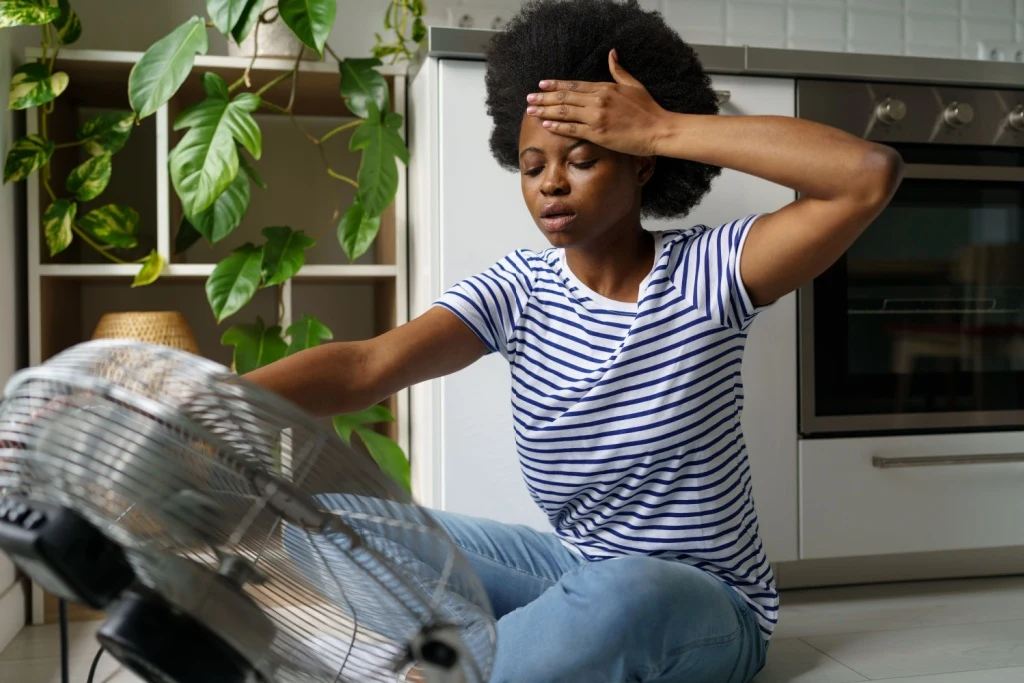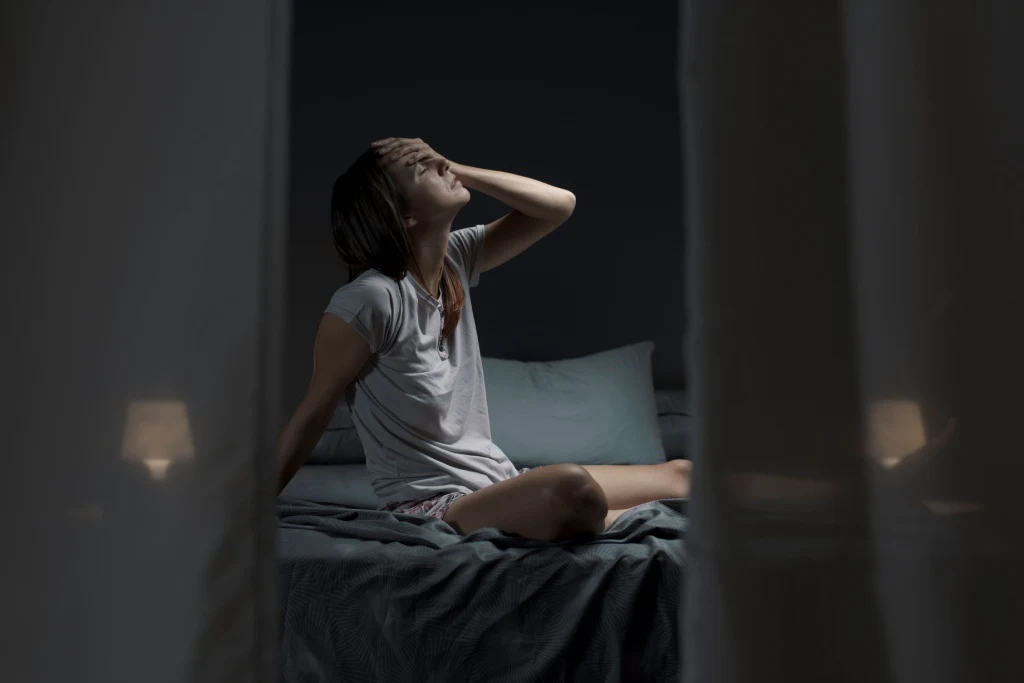Do You Get Night Sweats During Your Cycle? Here’s Why
We know it’s common during menopause, but for many women, night sweats go hand in hand with their menstrual cycle.

January 13, 2025 - Updated January 13, 2025

There are times when you expect to get sweaty. During a particularly intense workout or a hot yoga class. If you’re someone that loves to recharge and recover in the sauna. When you’re at the beach on a particularly warm day. When you’re feeling struck down with a fever. But waking up in the middle of the night feeling drenched from head to toe? Well, that’s not always something you can plan for. And unfortunately for us women, we’re impacted by night sweats at a much higher frequency than men.
We know that night sweats and hot flushes are common during perimenopause and menopause, but what if you’re experiencing them regularly and you’re not at that stage of life yet? Could your period be causing it? And more importantly, can anything be done about it?
What are night sweats and hot flashes?
First things first, you might be wondering what exactly night sweats and hot flashes are. While sweating is your body’s unique way of cooling itself down and keeping your body at a comfortable and safe temperature, night sweats and hot flashes are typically anything but comfortable.
According to the Cleveland Clinic, night sweats are when you sweat enough to soak through your clothes and bedding and disturb your sleep. As the NHS highlights, it’s normal to get sweaty if your environment or bedding are too warm, but night sweats can occur even when there are no environmental factors at play, with the most common causes including menopause, anxiety, alcohol or drug use, low blood sugar, some medications and a condition called hyperhidrosis.
Hot flashes tend to come on quickly and last anywhere between one and five minutes, according to Harvard Health. They say that although the physiology has been extensively studied, no one is certain why or how they occur beyond hormonal changes.

Night sweats and your period
While we know some of the more common reasons for night sweats, most healthcare providers are quick to acknowledge that sometimes the cause is unknown while anecdotal and scientific evidence both suggests that for some women, the menstrual cycle plays a part. Even if you’re not sweating, you may find that hormonal fluctuations throughout your cycle can impact your sleep quality.
A 1993 study explored the occurrence of night sweats and hot flashes similar to those experienced during menopause in women aged 18 to 45. To add an extra layer to their findings, the researchers - who all specialised in obstetrics and gynaecology - included three distinct groups of subjects. Women with confirmed premenstrual syndrome (PMS), women with chronic cycle-related symptoms and women without cycle-related symptoms.
Across each group, episodes of chills and sweats closely mirrored where the women were in their menstrual cycle, occurring most commonly during their periods, with no statistically significant differences across age groups.
However, those who were not impacted by cycle-related symptoms were least likely to experience sweats and chills, with only 43.1% reporting this. In contrast, 83.4% of the PMS cohort and 81.5% of the chronic cycle-related symptom group experienced at least one episode.
According to the Cleveland Clinic, the time before your period is most commonly associated with PMS and chronic cycle-related symptoms, and this is also the time when your estrogen levels decrease. Symptoms include cramping, irritability and - you guessed it - night sweats.
Night sweats during perimenopause
Perimenopause is the stage before menopause and can last anywhere between four and eight years. As menopause begins after your final period, during perimenopause you’ll still have a period, but will likely find your cycle is irregular as your ovaries begin to wind down.
If you’re going through perimenopause you might find night sweats and hot flushes are a common occurrence. A 2021 study published in The Journal of The Menopause Society found that in the five to 10 years before their final menstrual cycle, 20% of subjects reported hot flashes and night sweats and 40% reported trouble sleeping.
So what exactly is going on in your body during the peri years? Fluctuating hormone levels cause the part of your brain that controls your body heat (known as the hypothalamus) to run into some difficulty regulating your body’s temperature. In response, your body ends up sweating too much in an effort to cool itself.

How to treat night sweats
If you’re going through perimenopause or have already reached menopause, hormone therapy may be an option that can help you deal with night sweats and other symptoms such as vaginal dryness.
Not yet at that stage of life? There are a number of options available if you’re after a better night’s sleep.
Avoid consuming caffeine, alcohol and spicy foods close to your bedtime as these can all cause a rise in body temperature and cause you to sweat
Opt for loose fitting, breathable fabrics when it comes to your pajamas and bedding to help keep you feeling cool and comfortable in bed
Cool down your bedroom with an airconditioner, fan or sleep with your window open if you can
Keep a bottle of cold water by your bed and drink plenty of water throughout the day
Always listen to your body
One thing we’ll always champion here at Sweat is the importance of listening to your body and seeking out help from a trusted medical professional if you feel like something’s not right. If night sweats are keeping you up at night or causing you concern, don’t feel afraid to reach out for help.

Amy is a writer and editor at Sweat. She has over a decade of experience in women’s publishing and digital media and has previously worked across titles including Mamamia, Grazia and Cosmopolitan.
* Disclaimer: This blog post is not intended to replace the advice of a medical professional. The above information should not be used to diagnose, treat, or prevent any disease or medical condition. Please consult your doctor before making any changes to your diet, sleep methods, daily activity, or fitness routine. Sweat assumes no responsibility for any personal injury or damage sustained by any recommendations, opinions, or advice given in this article.
Wellbeing